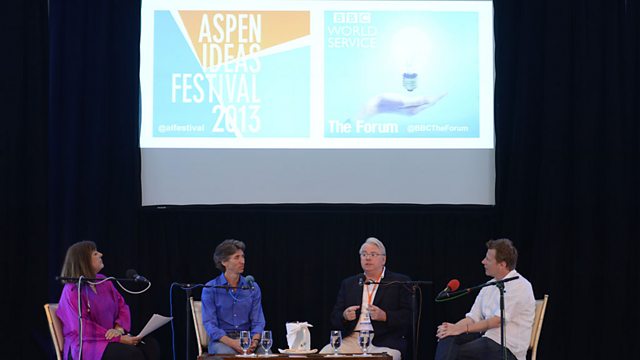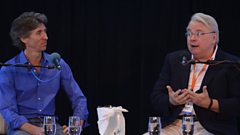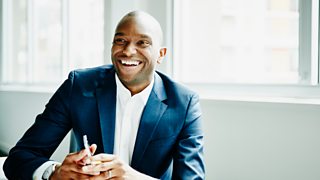Can Artists Make the World a Better Place?
Can putting art in unusual places help improve our world?
When you think about people trying to change the world for the better, should artists be near the top of the list? Bridget Kendall explores this question at the Aspen Festival of Ideas in Colorado, in front of a lively festival audience.
She is joined by: Damian Woetzel, former Principal Dancer at the New York City Ballet and the man behind an eye-catching initiative in inner-city schools called Arts Strike; ground-breaking designer Fred Dust, who says good design should be much more than simply creating beautiful objects; and art collector and philanthropist Dennis Scholl, who likes creating ‘happy surprises’ in the shape of Random Acts of Culture.
(Photo: (Left to right) Bridget Kendall, Damian Woetzel, Dennis Scholl and Fred Dust Credit © All rights reserved by aspeninstitute-internal)
Last on
More episodes
Next
Clip
Chapters
-
How do the arts make society better?
Duration: 07:58
Damian Woetzel: Arts Strike
Duration: 05:08
Dennis Scholl: Random Acts of Culture
Duration: 09:54
Fred Dust: Everyone's a designer
Duration: 17:30
Damian Woetzel
![Damian Woetzel]()
When he is not producing or directing dance and music performances, Damian Woetzel, director of the Aspen Institute Arts Program, heads a number of initiatives to broaden the appeal of many different art forms. He works with Yo-Yo Ma and his Silk Road Project in the New York City Public Schools, and is also behind an eye-catching project to bring more culture into inner-city education, healthcare and other public services called the .
Photo credit © All rights reserved by aspeninstitute-internal
Dennis Scholl
![Dennis Scholl]()
Bring a 600-strong opera chorus to a department store, or a group of ballroom dancers to an airport? It’s all in a day’s work for Dennis Scholl, the man credited with��creating ‘happy surprises’ in the shape of . Hoping to ‘dim the bright lights’ that sometimes create a barrier between artists and the public, Dennis is on a mission to make professionally-produced culture available to all.
Photo credit © All rights reserved by aspeninstitute-internal
Fred Dust
![Fred Dust]()
A partner at a leading design firm Ideo, Fred Dust says that good design should be about so much more than simply creating beautiful objects: it should make even unwieldy bureaucracies work better for us, ordinary citizens. Fred has been applying his design thinking to major brands, charities and non governmental organizations, the US government, and recently to a of CEOs from Silicon Valley’s most innovative companies.
Photo credit © All rights reserved by aspeninstitute-internalComment on the programme
Life is chaotic, hence art strives to create an order out of chaos. It strives to unite what seems to be scattered. The world of the art creates another reality, another Eden which is a sole creation of human beings. We experience living our lives in a parallel universe which is more durable, complete, and satisfactory.
Literature, for example, provides us escape to a world which is beyond the control of human atrocities. We multiply ourselves, our individuality, a kind of incarnation we experience. We are at the same time an objective reader and a character which affects and is affected by the chain of events in the story. You become what you always wanted to become. We transform and re-transform ourselves.
Elia Khan
��
In Next Week's Programme
We debunk a few myths about the sea and survival, with Baltasar Kormakur, who has made a film about a fisherman who swam for hours in Iceland’s freezing waters; medical expert Michael Tipton, who spent years studying endurance in extreme environments; and Indian psychiatrist�� Dinesh Bhugra, whose work on surviving trauma includes the aftermath of the Indian Ocean tsunami.Broadcasts
- Sat 13 Jul 2013 23:06GMT����ý World Service Online
- Sun 14 Jul 2013 10:06GMT����ý World Service Online
- Mon 15 Jul 2013 02:06GMT����ý World Service Online
Do you think political or business leaders need to be charismatic? Or do you prefer highly competent but somewhat stern people?
Podcast
-
![]()
The Forum
The programme that explains the present by exploring the past







